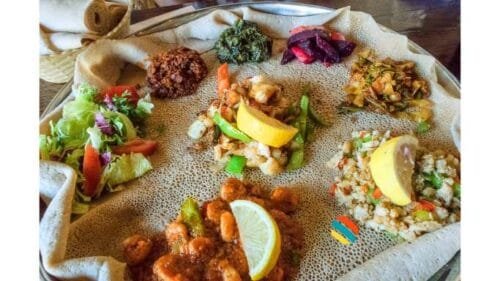Flavors of Ethiopian Food
Ethiopian food is a dynamic articulation of social legacy, flaunting a novel culinary custom that entices the taste buds and starts interest. Portrayed by its rich flavors, brilliant introductions, and mutual eating experience, Ethiopian food welcomes cafes to enjoy feasts that recount accounts of the local area, history, and love.
From the notable injera to the complicated zest mixes like berbere, Ethiopian cooking offers a remarkable culinary excursion that is as much about sharing as it seems to be about the actual food.
The Heart of Ethiopian Cuisine: Injera

At the centre of Ethiopian feasting lies injera, an elastic, sharp flatbread made essentially from teff flour. This grain, endemic to Ethiopia, isn’t just nutritious in addition without gluten, Making injera is a craftsmanship. It requires a fermentation process.
This gives it a tangy flavour and airy texture. Injera is cooked on a large circular griddle called a mitad. It serves as both a food base and a utensil. It is perfect for scooping up various stews and dishes.
Ethiopian households serve meals on a communal platter. It has layers of injera topped with colorful dishes, known as wats. This shared meal fosters community. Diners gather around a platter to enjoy its diverse flavours.
A Symphony of Spices: The Role of Berbere
One can’t discuss Ethiopian cooking without referencing berbere, the zest mix that gives profundity and warmth to numerous customary dishes. This flexible blend frequently incorporates stew peppers, garlic, ginger, and an assortment of other aromatics like fenugreek, cinnamon, and cardamom.
The unpredictable equilibrium of flavours in Berbere upgrades the flavour profiles of both vegan and meat dishes. It’s not only a flavouring; it typifies the spirit of Ethiopian food, frequently high quality by families and gone down through ages.
Alongside berbere, other spices play significant roles in Ethiopian kitchens Niter kibbeh, a flavoured explained margarine, is vital in cooking, adding lavishness to stews and sautéed dishes. Dishes like doro wat — a fiery chicken stew — embody the quintessence of Ethiopian flavours, joining berbere with onions and niter kibbeh to make a generous dinner that resounds with warmth and fulfilment.
Popular Ethiopian Dishes
-
Doro Wat:
This chicken stew is loved for its bold flavours. It has a base of caramelized onions, garlic, and berbere. Adding hard-boiled eggs at the end of cooking adds comfort. It’s a perfect family meal for festive gatherings.
-
Kitfo
is the Ethiopian equivalent of steak tartare. It is finely minced raw beef seasoned with spicy mixes, especially mitmita, and enriched with niter kibbeh. Kitfo is a dish with a unique flavour, often eaten on special occasions. It’s traditionally served with ayin (Ethiopian cottage cheese) and sautéed greens.
-
Misir Wat:
A vegetarian stew of red lentils and spices. It is a delightful, nutritious dish that utilizes berbere flavour. This dish is a staple during fasting in Ethiopia. It shows the country’s diverse cooking and respect for vegetarianism.
-
Tibs:
This dish varies widely across Ethiopia. It consists of sautéed meat, often lamb or beef, with onions, peppers, and more berbere. Tibs can be dry-fried or served in a rich, spicy sauce. This offers burger joints an empowering taste insight.
The Ethiopian Bunna: A Social Staple
The bunna is key to Ethiopian culture. It is a communal ritual, lasting hours. It is more than brewing coffee. It is about conversation and connection. Coffee beans are roasted before guests while burning incense.
The aroma lures them into a relaxed state of togetherness. This vibrant ceremony shows the value of hospitality in Ethiopian culture. It also highlights coffee’s role in social gatherings.
Conclusion
Ethiopian food is a tempting mix of flavours and traditions. It invites exploration and appreciation. The soft sponge of injera captures every essence of the dishes it holds. The intricate spice blends bring life to every meal. Ethiopian cuisine reveals a world rich in history and community.
Each dish tells a story. Whether it’s your first time trying doro wat or enjoying the warmth of misir wat. It’s a tale of shared meals, love, and heritage. For a great culinary adventure, try Ethiopian food. Let your taste buds explore a delightful journey!
Discover the Best Ethiopian Snacks and Street Food

